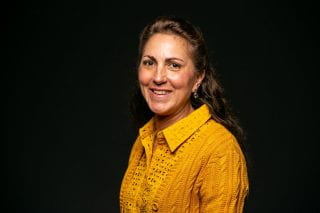Frances Scala:
Tireless Advocate for the Preservation of her Italian American Community
By Carla Simonini, Loyola University Chicago
October is Italian-American heritage Month, chosen to coincide with the federal Columbus Day holiday, which in recent years has become a flashpoint for conflict about how we understand the “American Dream” and the values we espouse as citizens of the United States. As noted by scholars of the Italian American experience (Connell, Deschamps, Ruberto, Sciorra), Italian immigrants through their cultural association with Columbus found a means to publicly celebrate themselves as participants in the foundation of their adopted nation and to counter widespread prejudices and discrimination against them. In the twenty-first century, though, Columbus’s legacy has come under scrutiny. In my adopted home city of Chicago, all of his statues have been removed, and it remains unclear whether or not they will ever be returned. But with or without the statues, Chicago is home to a rich and vibrant Italian American community comprised of individuals who have made positive contributions to and have had a much more direct impact on the city than the fifteenth century Genovese explorer. One woman who stands out, and on whom I wish to focus today, is Florence Scala. In defiance of commonly held stereotypes, Scala served as an advocate for the rights and well-being of her fellow Italian Americans. She launched a campaign that swayed public opinion and effected institutional change, in the face of fierce opposition and even personal threat. Anyone who clings to the image of the self-sacrificing Italian mother and wife confined to the domestic sphere, or the belief that Italians are afflicted with “amoral familism” that renders them unable to transcend the immediate material interests of the family in support of the common good, needs to study the life of this extraordinary woman.
Florence Scala was born Florence Giovangelo on September 17, 1918. She and her two brothers were the children of Italian immigrants who had settled on Taylor Street, a predominantly Italian neighborhood on Chicago’s near west side. Growing up her family was too poor to send her to school, so she began attending lessons at Hull House, where she met and befriended its founder, Jane Addams. She was so grateful for the education she received there that she worked as a volunteer up to six days a week until her marriage to Charles Scala in 1954. While working at Hull House, she was encouraged to study urban planning, which provided her with a foundation for combatting a proposal to build a new campus for the University of Illinois Chicago in Taylor Street’s Little Italy. From the moment that the city announced its plans to raze blocks of houses and businesses in Scala’s community in 1961, she committed herself to preserving her neighborhood and its culture.
In an interview with Studs Terkel, Scala reports that the news of the neighborhood’s imminent demise hit the community like “a bombshell,” and that what shocked them the most was how much land the city planned to take. “They were out to demolish our entire community,” she stated. In a few short days Scala gather over 150 people and organized a protest march on City Hall. This led to her founding the Harrison-Halstead Community Group, which led the fight to stop the proposed building campaign. Their battle lasted for many months and went all the way to the U.S. Supreme Court. In additional to initiating legal action, Scala led other protests, including a women’s sit-in which 50 women took possession of the mayor’s office for three hours. They pounded on furniture, threw materials around and accosted Mayor Daley, who they viewed as having betrayed a community that had supported his political agenda. Scala reportedly stated that they were going to make the mayor “understand what it is like to live in a real democracy.”
In the end the group’s efforts proved to be insufficient. The city bulldozed more than 800 houses and 200 businesses to make way for the new University of Illinois campus. The campaign was not a complete defeat, though. Scala and her group successfully persuaded the university’s trustees to preserve the original Hull House building as a museum and memorial to Jane Addams, and the strategy that the Harrison-Halstead Community Group employed in defense of the neighborhood became a model for future battles for neighborhood preservation.
Scala proved herself not only a capable community organizer but also an intrepid crusader. In October 1962, in the midst of the neighborhood’s fight, someone planted a bomb in her home, which ripped through three stories of the building’s porches and shattered its windows. Still, she was not deterred. And later, in 1964, she took on her ward’s notoriously corrupt Democratic machine by running as a write-in candidate for alderman. She lost by a landslide but succeeded in sending a message to the powers that be.
From 1980 through 1990 Scala proved her prowess as a business woman and purveyor of Italian American cuisine as she and her brother ran a successful restaurant, appropriately named Florence, in the same building where they grew up. The menu preserved traditional recipes, including grilled veal and a number of pastas, and it was immensely popular even with her formal rivals. University of Illinois students ate there, and so did Mayor Daley himself. Scala closed the restaurant in 1990, five years after her husband’s death, declaring that she no longer had the energy to maintain a 6-day a week schedule. However, she continued to engage in community activism up until death at age 88 in 2007.
As a memorial tribute Mayor Daley released the statement, “Florence Scala brought passion to everything she did and was committed to her community in a way all Chicagoans can emulate. She left her mark on our city.” Her nephew Steven Giovangelo told the Chicago Tribune that “She had a great sense of compassion, of wanting people to be treated fairly. She had a vision of the community and city that centered around caring for one another.”
As we celebrate Italian American Heritage Month I encourage everyone not only to celebrate this exceptional women, but also the many other Italian American women who toiled to make life better for their families and their communities in smaller and more personal ways. These unsung heroines can be found scattered among the branches of our family trees. Let us take some time to remember and celebrate their sacrifices and struggles and be grateful for the how they have made our lives so much better today.

